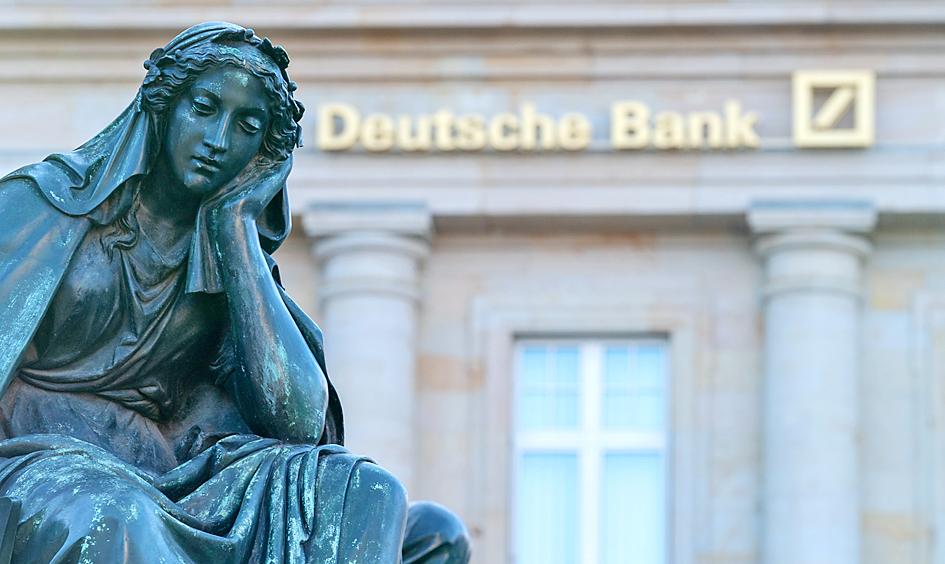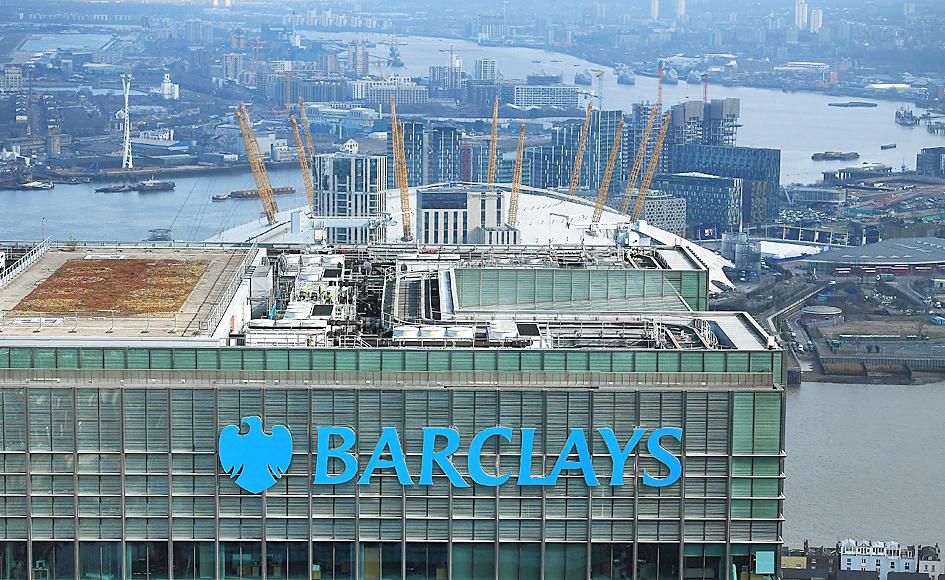A new investigation by the International Consortium of Investigative Journalists (ICIJ) says JPMorgan Chase & Co, Deutsche Bank AG and several global banks “kept profiting from powerful and dangerous players” in the past two decades even after the US imposed penalties on these financial institutions.
The report, based on leaked documents obtained by BuzzFeed News and shared with the consortium, said that in some cases the banks kept moving illicit funds after receiving warnings from US officials.
The documents identified more than US$2 trillion in transactions between 1999 and 2017 that were flagged by financial institutions’ internal compliance officers as possible money laundering or other criminal activity, the report said.

Photo: EPA-EFE
The top two banks are Deutsche Bank, which disclosed US$1.3 trillion of suspicious money in the files, and JPMorgan, which disclosed US$514 billion, the analysis found.
Other lenders include HSBC Holdings PLC, Standard Chartered PLC and Bank of New York Mellon Corp, it said.
A wave of hefty fines against major banks in the past decade spurred an explosion in the number of transactions that lenders flag as suspect to the US government.

Photo: EPA-EFE
Still, it is not clear all the scrutiny is making a difference. Banks moved money for people or entities they could not identify, and in many cases failed to file the required suspicious activity reports until years afterward, the investigation found.
“They need to do a better job of shutting down these accounts once they see repeated reasons for filing suspicious activity reports,” Tom Cardamone, managing director of Global Financial Integrity, a Washington-based organization tracking illegal money flows worldwide, said in a telephone interview.
There are “clients so bad that numerous SARs [suspicious activity reports] are being filed about them, but no one ever does anything about it,” he said.
The documents revealed on Sunday shed light on a faulty system where banks complain about reports that get no follow-up from authorities, while critics say lenders are checking off boxes without taking meaningful steps to stop financial crime.
It all risks another black eye for major international banks that paid a total of US$20 billion from 2012 through 2015 for having lax controls against money laundering, helping clients evade taxes or violate US sanctions.
The investigation was based on more than 2,100 SARs filed by banks with the US Department of the Treasury’s Financial Crimes Enforcement Network.
The report, dubbed the FinCEN Files, was the result of an investigation by more than 100 news organizations in 88 countries, Buzzfeed said.
Large fines on HSBC and Standard Chartered in 2012 helped spur a spike in SARs, from about 60,000 that year to more than 2 million annually in recent years.
Yet law enforcement agencies inquire about only 4 percent of those alerts, according to a Bank Policy Institute survey.
Only 1 percent of illicit money in the financial system is confiscated, the UN estimates.
While regulators require banks to file suspicious activity reports within 30 to 60 days, many firms took months or even years on average to flag the suspect transactions they saw, the report said.
Bank Policy Institute, an industry group, said banks are legally prohibited from talking about SARs.
Based on past instances, some cases are likely connected to requests by law enforcement to keep a so-called suspicious account open so authorities are able to follow the money trail before mounting an arrest or conviction, it said.
Banks have hired thousands of employees to beef up anti-money laundering and financial crime teams, and some withdrew from certain countries and dropped correspondent-banking ties with hundreds of smaller lenders.
One example highlighted in the report: JPMorgan moved more than US$1 billion for the fugitive financier behind Malaysia’s 1MDB scandal, based on records.
It also processed payments for Paul Manafort, the former campaign manager for US President Donald Trump, after he resigned from the campaign amid money laundering and corruption allegations from his work with a pro-Russian political party in Ukraine.

WAITING GAME: The US has so far only offered a ‘best rate tariff,’ which officials assume is about 15 percent, the same as Japan, a person familiar with the matter said Taiwan and the US have completed “technical consultations” regarding tariffs and a finalized rate is expected to be released soon, Executive Yuan spokeswoman Michelle Lee (李慧芝) told a news conference yesterday, as a 90-day pause on US President Donald Trump’s “reciprocal” tariffs is set to expire today. The two countries have reached a “certain degree of consensus” on issues such as tariffs, nontariff trade barriers, trade facilitation, supply chain resilience and economic security, Lee said. They also discussed opportunities for cooperation, investment and procurement, she said. A joint statement is still being negotiated and would be released once the US government has made

Authorities have detained three former Taiwan Semiconductor Manufacturing Co (TMSC, 台積電) employees on suspicion of compromising classified technology used in making 2-nanometer chips, the Taiwan High Prosecutors’ Office said yesterday. Prosecutors are holding a former TSMC engineer surnamed Chen (陳) and two recently sacked TSMC engineers, including one person surnamed Wu (吳) in detention with restricted communication, following an investigation launched on July 25, a statement said. The announcement came a day after Nikkei Asia reported on the technology theft in an exclusive story, saying TSMC had fired two workers for contravening data rules on advanced chipmaking technology. Two-nanometer wafers are the most

NEW GEAR: On top of the new Tien Kung IV air defense missiles, the military is expected to place orders for a new combat vehicle next year for delivery in 2028 Mass production of Tien Kung IV (Sky Bow IV) missiles is expected to start next year, with plans to order 122 pods, the Ministry of National Defense’s (MND) latest list of regulated military material showed. The document said that the armed forces would obtain 46 pods of the air defense missiles next year and 76 pods the year after that. The Tien Kung IV is designed to intercept cruise missiles and ballistic missiles to an altitude of 70km, compared with the 60km maximum altitude achieved by the Missile Segment Enhancement variant of PAC-3 systems. A defense source said yesterday that the number of

Taiwanese exports to the US are to be subject to a 20 percent tariff starting on Thursday next week, according to an executive order signed by US President Donald Trump yesterday. The 20 percent levy was the same as the tariffs imposed on Vietnam, Sri Lanka and Bangladesh by Trump. It was higher than the tariffs imposed on Japan, South Korea and the EU (15 percent), as well as those on the Philippines (19 percent). A Taiwan official with knowledge of the matter said it is a "phased" tariff rate, and negotiations would continue. "Once negotiations conclude, Taiwan will obtain a better